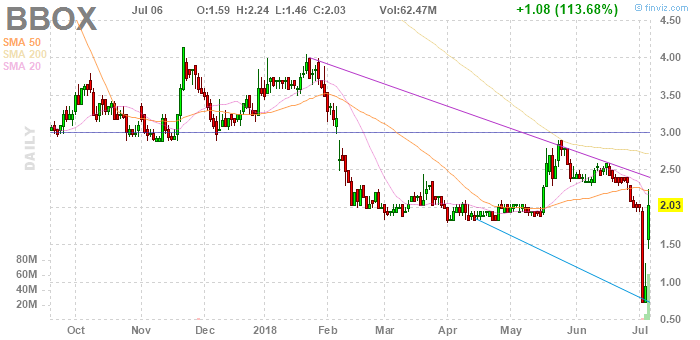Black Box Corporation (NASDAQ:BBOX): Black Box shares jumped more than 110% on Friday after plummeting close to 60% earlier last week in response to liquidity concerns. The latest rally in BBOX shares was the result of the announcement of a large contract with a prominent European social media platform.

Black Box shares are trading around $2 at present after hitting the 52-week low of $0.75 a share last week due to liquidity concerns. The shares are also trading significantly lower compared to its highest level of $8.45 during the latest bull-run; the stock is down 75% since the last twelve months. The BBOX stock currently has a 52-week trading range of $0.75 – $8.45.
Black Box Shares Drop Last Week: Liquidity Concerns
The digital solutions provider for building and managing IT infrastructure has been experiencing severe bankruptcy threats. The company’s business hasn’t been providing sufficient cash flow to fund its operating activities and its losses are widening over the last few quarters.
>> Stitch Fix Shares Hit All-Time High Amid Rosy Outlook
Joel Trammell, President and CEO, admitted to the looming threats regarding Black Box’s liquidity position. He said, “I acknowledge the near-term challenges that we need to overcome as noted in the Liquidity section of our Form 10-Q, and we are working on them.”
The Pittsburgh-based company has $155.7M of debt, and its accounts payable is standing around $100 million at the end of the last quarter. Additionally, the company has only about $24M in cash; its current internal cash generation potential isn’t sufficient for the company to run its business operations smoothly.
Does the New Contract Help in Relieving Liquidity Concerns?
Black Box announced that they had signed a $10-million contract with a European social media platform, with potential data center work exceeding $300M or more in the long-term—the most significant deal in the company’s history. Traders have applauded the news as they believe the new contract will immediately enhance its cash position and help in refinancing the company.
Featured Image: Depositphotos/© BrianAJackson










